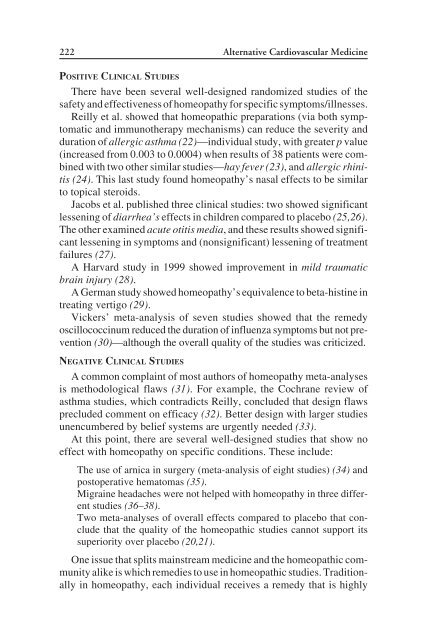Complementary Alternative Cardiovascular Medicine
Complementary Alternative Cardiovascular Medicine
Complementary Alternative Cardiovascular Medicine
You also want an ePaper? Increase the reach of your titles
YUMPU automatically turns print PDFs into web optimized ePapers that Google loves.
222 <strong>Alternative</strong> <strong>Cardiovascular</strong> <strong>Medicine</strong><br />
POSITIVE CLINICAL STUDIES<br />
There have been several well-designed randomized studies of the<br />
safety and effectiveness of homeopathy for specific symptoms/illnesses.<br />
Reilly et al. showed that homeopathic preparations (via both symptomatic<br />
and immunotherapy mechanisms) can reduce the severity and<br />
duration of allergic asthma (22)—individual study, with greater p value<br />
(increased from 0.003 to 0.0004) when results of 38 patients were combined<br />
with two other similar studies—hay fever (23), and allergic rhinitis<br />
(24). This last study found homeopathy’s nasal effects to be similar<br />
to topical steroids.<br />
Jacobs et al. published three clinical studies: two showed significant<br />
lessening of diarrhea’s effects in children compared to placebo (25,26).<br />
The other examined acute otitis media, and these results showed significant<br />
lessening in symptoms and (nonsignificant) lessening of treatment<br />
failures (27).<br />
A Harvard study in 1999 showed improvement in mild traumatic<br />
brain injury (28).<br />
A German study showed homeopathy’s equivalence to beta-histine in<br />
treating vertigo (29).<br />
Vickers’ meta-analysis of seven studies showed that the remedy<br />
oscillococcinum reduced the duration of influenza symptoms but not prevention<br />
(30)—although the overall quality of the studies was criticized.<br />
NEGATIVE CLINICAL STUDIES<br />
A common complaint of most authors of homeopathy meta-analyses<br />
is methodological flaws (31). For example, the Cochrane review of<br />
asthma studies, which contradicts Reilly, concluded that design flaws<br />
precluded comment on efficacy (32). Better design with larger studies<br />
unencumbered by belief systems are urgently needed (33).<br />
At this point, there are several well-designed studies that show no<br />
effect with homeopathy on specific conditions. These include:<br />
The use of arnica in surgery (meta-analysis of eight studies) (34) and<br />
postoperative hematomas (35).<br />
Migraine headaches were not helped with homeopathy in three different<br />
studies (36–38).<br />
Two meta-analyses of overall effects compared to placebo that conclude<br />
that the quality of the homeopathic studies cannot support its<br />
superiority over placebo (20,21).<br />
One issue that splits mainstream medicine and the homeopathic community<br />
alike is which remedies to use in homeopathic studies. Traditionally<br />
in homeopathy, each individual receives a remedy that is highly


